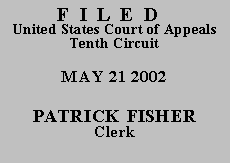

|
UNITED STATES OF AMERICA,
v.
ZOUHAIR MIFTAH |
00-CR-10072-JTM) |
Before KELLY, McKAY, and MURPHY, Circuit Judges.
This case is before the court on Zouhair Miftah's pro se request for a certificate of appealability ("COA"). Until Miftah obtains a COA, he cannot appeal the district court's denial of the motion to vacate, set aside, or correct his sentence which he brought pursuant to 28 U.S.C. § 2255. See 28 U.S.C. § 2253(c)(1)(b) (providing that a petitioner may not appeal the denial of a § 2255 motion unless he first obtains a COA).
Miftah pleaded guilty to one count of knowingly distributing 11.32 grams of crack cocaine in violation of 21 U.S.C. § 841(a). In exchange for his guilty plea, two additional counts in the indictment returned against him were dismissed. The dismissed charges, however, were used to determine Miftah's offense level under the sentencing guidelines. See United States v. Gay, 240 F.3d 1222, 1229 n.6 (10th Cir. 2001) ("[A] sentencing court may consider drug quantities from dismissed counts as relevant conduct . . . ."). Miftah was sentenced to 108 months' imprisonment.
Miftah has filed a motion pursuant to 28 U.S.C. § 2255 wherein he challenges his conviction and sentence on the grounds that: (1) the government did not have standing to "state or defend the claim" against him because it had not "exhausted all administrative remedies prior to bringing [the] claim before the United States District Court"; (2) the trial court did not have subject matter jurisdiction because he was never "within the bounds of the District of Columbia, territories nor possessions of the United States, a federal corporation"; (3) the indictment failed to charge the amount of the controlled substances used to calculate his sentence; and (4) his counsel was ineffective. The district court considered and rejected each of Miftah's claims, concluding that the charges against Miftah were properly prosecuted in the United States District Court for the District of Kansas because the crimes occurred within the District of Kansas(1); that the indictment clearly set forth the amount of drugs used to calculate Miftah's guidelines sentence; and that Miftah had failed to demonstrate that his counsel was ineffective. The district court also concluded that Miftah's guilty plea was made knowingly and voluntarily.
Miftah is not entitled to a COA unless he can make "a substantial showing of the denial of a constitutional right." 28 U.S.C. § 2253(c)(2). Miftah can make that showing by demonstrating that: (1) the issues raised are debatable among jurists, (2) a court could resolve the issues differently, or (3) that the questions presented deserve further proceedings. See Slack v. McDaniel, 529 U.S. 473, 483-84 (2000).
Based on our review of Miftah's request for a COA, his appellate brief, the district court's order, and the entire record before us, we conclude that the district court's disposition of Miftah's § 2255 motion is not deserving of further proceedings, debatable among jurists of reason, or subject to different resolution on appeal. Accordingly, Miftah has failed to make the required substantial showing of the denial of a constitutional right and is not entitled to a COA. See 28 U.S.C. § 2253(c)(1)(b). This court denies Miftah's request for a COA for substantially those reasons set forth in the district court's order dated November 20, 2001, and dismisses this appeal.
ENTERED FOR THE COURT
Michael R. Murphy
Circuit Judge
*. This order and judgment is not binding precedent, except under the doctrines of law of the case, res judicata and collateral estoppel. The court generally disfavors the citation of orders and judgments; nevertheless, an order and judgment may be cited under the terms and conditions of 10th Cir. R. 36.3.
1. See 18 U.S.C. §§ 3231 and 3232.